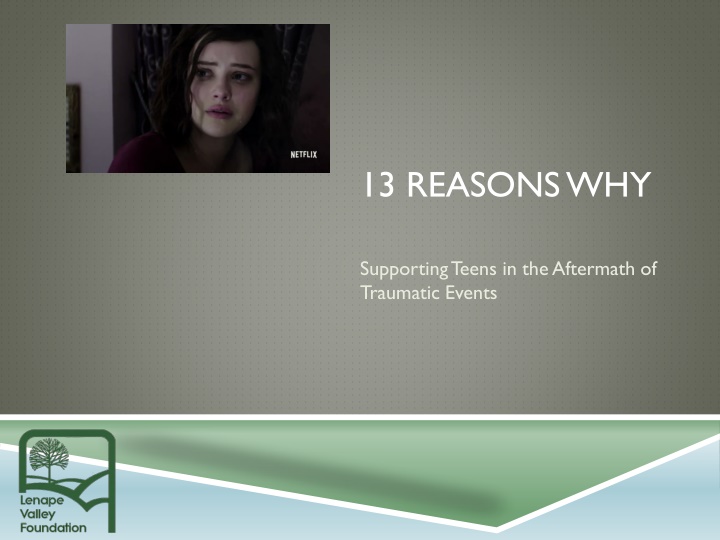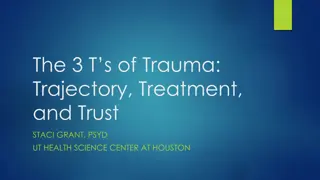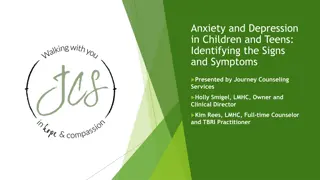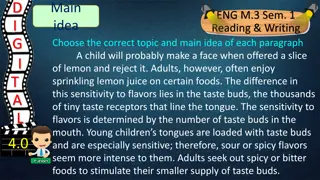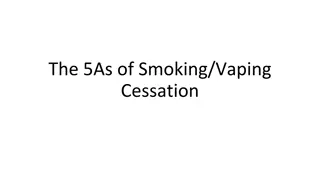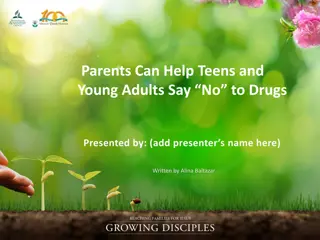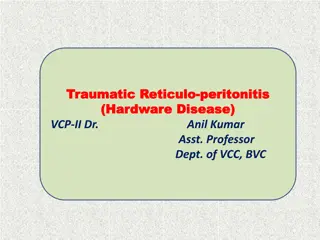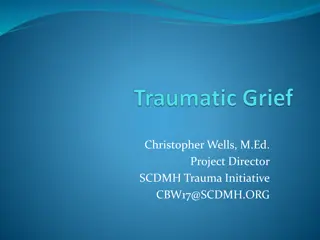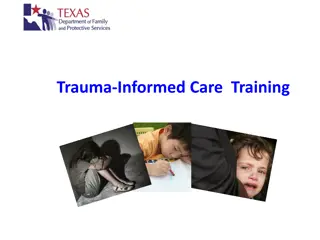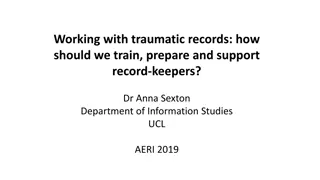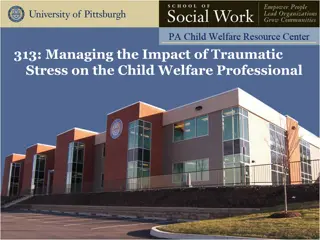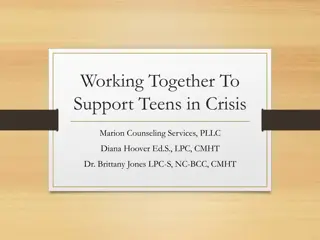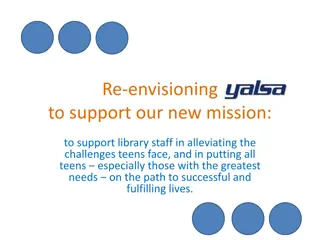Supporting Teens After Traumatic Events: Insights and Guidance
Understanding and addressing the impact of trauma on teenagers is crucial in providing effective support. This resource delves into various traumatic experiences such as bullying, abuse, and loss, highlighting the resulting challenges like anxiety and withdrawal. Strategies for supporting teens, including fostering open communication, showing empathy, and addressing guilt and shame, are addressed to help caregivers and individuals navigate post-trauma recovery effectively.
Download Presentation

Please find below an Image/Link to download the presentation.
The content on the website is provided AS IS for your information and personal use only. It may not be sold, licensed, or shared on other websites without obtaining consent from the author.If you encounter any issues during the download, it is possible that the publisher has removed the file from their server.
You are allowed to download the files provided on this website for personal or commercial use, subject to the condition that they are used lawfully. All files are the property of their respective owners.
The content on the website is provided AS IS for your information and personal use only. It may not be sold, licensed, or shared on other websites without obtaining consent from the author.
E N D
Presentation Transcript
13 REASONS WHY Supporting Teens in the Aftermath of Traumatic Events
Bullying Shaming Rejection Isolation Psychological abuse Sexual exploitation Sexual assault or rape LGBTQ issues Physical abuse Assault Community violence Abandonment Bereavement Loss of familiar situations, friends, family, environment Natural disasters Accidents Neglect Image from Marybicknell.com Image from Marybicknell.com
IMPACT OF TRAUMA Anxiety, panic attacks Depression Difficulty sleeping, nightmares Flashbacks of the event Easily startled or triggered Image from clipart-library.com
Easily angered, irritability May withdraw from others, avoid school Physical complaints Looking to escape from the pain, emotional numbing
JOYNERS SUICIDE RISK MODEL Thwarted Belongingness Acquired Capacity Perceived Burdensomeness Thomas Joiner, PhD
SUPPORTING TEENS IN THE AFTERMATH OF TRAUMA First and foremost, believe them! Don t minimize what has happened Don t try to get too quickly to it will be ok Try to avoid over-reacting Helpguide.org
Do encourage them to talk; if they dont want to talk, encourage staying engaged, be together Show that you can be strong and be a support Netflix.com
Express your love and support Ask what would be the most helpful Be aware of media exposure, social media Validate their feelings and concerns Help build hope for the future clipartfest/com
GUILT AND SHAME If the teen was a victim of someone else s behavior, reassure them it was not their fault Help the teen discern the difference between things he/she is responsible for and things he/she is not Talk about feelings of unfairness, guilt, shame, anger, desire for revenge conexuscounseling.ca
If the teen did something of which he/she is not proud, talk about taking responsibility, making amends, doing better next time Never blame the victim for being in the wrong place, dressing inappropriately, drinking too much Differentiate between doing things in the future to enhance safety vs. inappropriately blaming the victim theclearingnw.com
BULLYING: WHAT YOU CAN DO Respond to the bully firmly, act confident even when you are not Do something unexpected (such as using humor) or something kind Don t walk alone, avoid isolated places, find allies Block the cyberbully through email, phone, social media Report any threats or violence Stick up for others who are being bullied Tell a trusted adult Teensafe.com
WAYS TO MANAGE OVERWHELMING EMOTIONS Self-soothing (think of relaxing via the 5 senses) Distraction for some respite Mindfulness practice, meditation, spiritual practice Pay attention to physical well-being: sleep, nutrition, exercise Stick to routines or create routines Minimize other sources of stress mashable.com
WHAT DO TRAUMA VICTIMS NEED? Being heard and respected Re-develop a sense of safety Re-establish a sense of autonomy and power linkedin.com
DEALING WITH THE PUSH AWAY Show support and care, don t give up Be patient Tolerate some lack of disclosure Talk about talking about it Theodesseyonline.com
Use other ways to communicate: notes, art, poetry, music Encourage talking with other trusted adults Agree upon how we would know things are getting too difficult learningforlife.fsu.edu
SAFETY PLANNING What keeps me going when times are hard? Reasons to want to live, things that give me hope Stressors and triggers: avoid when I can, be prepared when they happen anyway Warning signs I might notice that indicate I am struggling Warning signs others might notice linkedin.com
Ways to cope that I can do on my own: listen to music, go for a walk, read something uplifting Ways to cope that I can do with others: meet for coffee, watch a movie Things I might be tempted to do that make things worse: isolate, stay up all night, use alcohol or drugs Things others might do that make things worse: saying that thing that annoys me, expecting too much of me yourtherapy.com
Creating a safe environment: Suicide-proof your home Create a plan for teens to signal parents when they need to be rescued from an uncomfortable social situation People to call for support
TREATMENT IS NEEDED WHEN YOU NOTICE Symptoms such as nightmares, flashbacks, trouble sleeping Difficulty functioning at school or in activities Symptoms are manifesting as physical complaints (headaches, stomach aches) Withdrawal, isolation Suicidal thoughts or self-harm behaviors saalma2014.wordpress.com
You could use some support vs. you need help Remember to get support for yourself if someone you are close to is hurting linkedin.com
